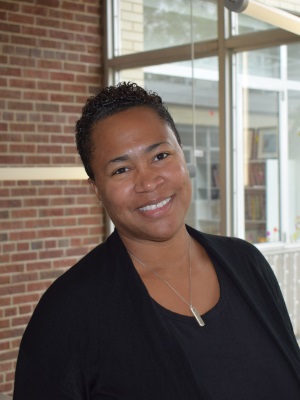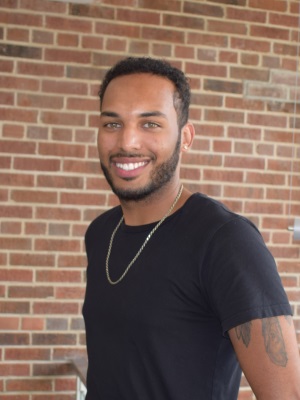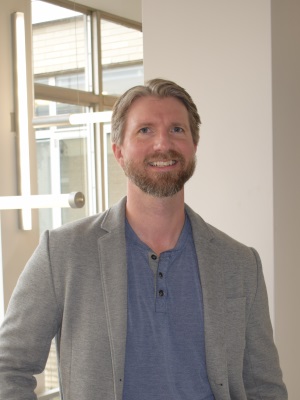Planning for the future, paying attention to the past
Thursday, September 30, 2021
The September COVID-19 Mitigation Strategies in Jail Settings Community of Practice webinar was the final webinar of a series that featured facilitated discussions with partners from across the country. Presenters discussed COVID-19 mitigation strategy updates for those working in jail settings. Participants had the opportunity to engage in a Q&A discussion with criminal-legal, public health, community, and behavioral health experts.
Back to the Community of Practice
Agenda:
- Updates to COVID-19 Mitigation Strategy #1: Testing & vaccination
Bianca Burch Bianca Burch, M.A., M.S.W.
Bianca Burch, M.A., M.S.W.Project Coordinator, Center for Behavioral Health and Justice
Bianca joined the CBHJ team September 2019 as a Project Coordinator. Before coming to the CBHJ, Burch was a project coordinator at The University of Michigan working on studies that focused on substance use, depression, and suicide prevention among adolescents and young adults in the Flint area. She was also a research associate at the Michigan Public Health Institute. During that time she provided technical assistance and coordinated data collection and entry, ongoing communication and collaboration with community partners throughout the state of Michigan.
- Updates to COVID-19 Mitigation Strategy #2: Contact tracing
Tyler Logan Tyler Logan, M.A.
Tyler Logan, M.A.Project Coordinator, Center for Behavioral Health and Justice
Tyler is a strong advocate for health equity and social justice. Much of his research work and interests have been embedded in identifying how historical, systemic, and environmental factors affect the health and wellbeing of marginalized communities. He is also a member of the Michigan Association for Evaluation, the American Public Health Association and the National Association for Health Service Executives. Prior to coming to the CBHJ, Tyler was involved in multiple evaluation projects throughout Michigan, and beyond, and brings valuable equity-focused evaluation, facilitation, community engagement, and partner collaboration practices to the team.
- Updates to COVID-19 Mitigation Strategy #3: Information sharing
Bianca Burch Bianca Burch, M.A., M.S.W.
Bianca Burch, M.A., M.S.W.Project Coordinator, Center for Behavioral Health and Justice
Bianca joined the CBHJ team September 2019 as a Project Coordinator. Before coming to the CBHJ, Burch was a project coordinator at The University of Michigan working on studies that focused on substance use, depression, and suicide prevention among adolescents and young adults in the Flint area. She was also a research associate at the Michigan Public Health Institute. During that time she provided technical assistance and coordinated data collection and entry, ongoing communication and collaboration with community partners throughout the state of Michigan.
- Updates to COVID-19 Mitigation Strategy #4: Discharge planning and decarceration
Tyler Logan Tyler Logan, M.A.
Tyler Logan, M.A.Project Coordinator, Center for Behavioral Health and Justice
Tyler is a strong advocate for health equity and social justice. Much of his research work and interests have been embedded in identifying how historical, systemic, and environmental factors affect the health and wellbeing of marginalized communities. He is also a member of the Michigan Association for Evaluation, the American Public Health Association and the National Association for Health Service Executives. Prior to coming to the CBHJ, Tyler was involved in multiple evaluation projects throughout Michigan, and beyond, and brings valuable equity-focused evaluation, facilitation, community engagement, and partner collaboration practices to the team.
- Panel Discussion
Panelists 
Dr. Alysse Wurcel, MD, MS
Infectious Diseases Physician, Tufts Medical Center
Assistant Professor, Tufts School of Medicine
Infectious Diseases Liaison, Massachusetts Sheriffs AssociationDr. Wurcel is an Assistant Professor in the Division of Geographic Medicine and Infectious Diseases (ID) at Tufts Medical Center in Boston, Massachusetts. She did internal medicine residency at Massachusetts General Hospital, and ID fellowship at Columbia-Presbyterian Hospital and Tufts Medical Center. In addition to her work as an inpatient ID doctor, Dr. Wurcel has an outpatient clinic where she specializes in HIV, HCV and substance use disorder care. Dr. Wurcel provides HIV and HCV care at six county jails in eastern MA. She is interested in the barriers and facilitators to care for people with or at risk for HIV and HCV, especially people who use drugs and people who are incarcerated. She is an international expert on injection-drug use associated infections, including bacterial endocarditis. Dr. Wurcel has a K08 grant from the Agency of Human Research and Quality to improve HCV testing access in jails. In April 2020, she was appointed as ID Liaison to the Massachusetts Sheriffs Association, and has been advising the county jails on COVID-19 prevention, mitigation, and vaccination strategies.
An undergraduate degree in sociology launched me into a career as an infectious diseases doctor working clinically and on research to improve the quality of care delivered to people who use drugs and people who are incarcerated.

Paul Elam, PhD
Chief Strategy Officer, Michigan Public Health InstitutePaul Elam is responsible for diversifying the Institute's portfolio to address cutting edge issues that affect the health and well-being of our society. His deep understanding of youth violence and prevention, crime and justice, and child maltreatment is nationally recognized. Elam brings a wealth of knowledge and experience measuring racial and ethnic disproportionality and believes that sound public policy analysis should include an examination of whether all people are being treated fairly and equitably. His current leadership efforts include mentoring and training professionals from historically underrepresented groups in culturally responsive and equitable engagement to ensure that the people who are most impacted are at the center of conversations which seek to find solutions to problems affecting them. Elam works closely with governmental, philanthropic, university, and nonprofit clients, providing strategic consultation to advance decisions in ways that improve lives, advance social justice and produce equitable outcomes. Elam earned a PhD in Family and Child Ecology, a Master's degree in Criminal Justice and Urban Studies, and a Bachelor's degree in Criminal Justice, all from Michigan State University.

Heather Walter-McCabe, JD, MSW
Associate Professor of Law and Social Work, Wayne State UniversityProfessor Heather Walter-McCabe holds a joint appointment at Wayne State University Law School and Wayne State University School of Social Work. Walter-McCabe began her career as a social worker at a high acuity pediatric tertiary care hospital in the Midwest working with families whose children had significant medical needs. After law school, she directed a public health research program examining the impact of firearm violence in Indiana. She later served as the executive director of the William H. and Christine H. Hall Center for Law and Health at Indiana University Robert H. McKinney School of Law before joining the faculty at the Indiana University School of Social Work.
Her research is done at the intersection of law, social work, and public health. Her research translates complex legal issues and research findings across multiple professions to make the information accessible for use by practitioners and advocates in improving population health. As a part of this work, Walter-McCabe was a Robert Wood Johnson Foundation Public Health Law Teaching Fellow from 2014-16.
Most recently she is leading research examining law and policy impacting LGBTQ health equity and well-being. She has published in traditional peer-reviewed academic journals and law reviews and has also been sought by media to explain core issues of public health policy. Walter-McCabe serves on the Executive Board of the American Public Health Association and is a contributing editor to the journal Social Work.

Sheriff Jerry Clayton
Sheriff, Washtenaw County Sheriff's OfficeJerry L. Clayton is a 33-year criminal justice professional, currently serving his fourth term as the Sheriff of Washtenaw County. Sheriff Clayton leads a value and mission driven organization, focused on co-producing public safety through community engagement and collaboration.
During his career with the Sheriff's Office, Jerry served in a variety of front-line and executive positions, Corrections Commander, Police Services Commander and SWAT Team Commander. For 25 years, Sheriff Clayton has been a certified criminal justice trainer and instructor, specializing in Cultural Diversity, Bias-Free Policing, Organizational Management and Leadership. He has provided training, monitoring and Subject Matter Expert consulting services to the US Department of Justice, the National Sheriff's Association, and the ACLU. Jerry has been Chairperson and a Governor appointed commissioner since 2013 for the Michigan Commission on Law Enforcement Standards. Sheriff Clayton also serves on the boards of numerous local non-profit organizations.

Brad Ray, PhD
Associate Professor of Social Work, Wayne State UniversityBrad Ray joined Wayne State University's School of Social Work as Associate Professor and Director of the Center for Behavioral Health and Justice in 2019. Ray received his PhD from North Carolina State University in Sociology in 2012 and spent seven years IUPUI where he served as a research director at the Indiana University Public Policy Institute. He is a community-engaged researcher that focuses on mental health and substance use, particularly where these populations intersect with the criminal justice system. Much of his recent research has focused on evaluating policies and interventions aimed at the recent overdose epidemic, and translating evidence-based harm reduction strategies into practice.
Ray is a Michigan native with a Bachelor's Degree in Sociology from Northern Michigan University where he assisted in a census of tribal communities. His early graduate research was on opioid overdose and later focused on mental health courts for his doctoral work. While center director at the Indiana University Public Policy Institute Ray received funding from numerous local, state, federal, and foundation sources to conduct research at the intersection of behavioral health, public health, and criminal justice systems. Much of this research is community-engaged and translational research but Ray has also developed, implemented, and managed clinical research experiments within criminal justice settings. Ray is excited to bring his skills and expertise to his home stateand especially to one of the world's most remarkable citiesand study the innovative work occurring across the state, and contributing to any positive change.
Moderated by: 
Bianca Burch, MA, MSW
Project Coordinator, Center for Behavioral Health and Justice
Tyler Logan, MA
Project Coordinator, Center for Behavioral Health and Justice
For questions and more information, please contact us.







